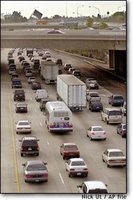 The Communist Party's Central Committee wants innovation. The Chinese people will want hundreds of millions of vehicles and in order to prevent health-killing air pollution, the need for pollution-free vehicles and renewable energy in China is clear. Mao Zongqiang is one of China抯 leading experts on hydrogen and other alternative fuels at Tsinghua University's Nuclear and New Energy Institute.
The Communist Party's Central Committee wants innovation. The Chinese people will want hundreds of millions of vehicles and in order to prevent health-killing air pollution, the need for pollution-free vehicles and renewable energy in China is clear. Mao Zongqiang is one of China抯 leading experts on hydrogen and other alternative fuels at Tsinghua University's Nuclear and New Energy Institute.Shen-Li High Tech Co. Ltd., a private company in Shanghai, is manufacturing a hydrogen fuel cell demonstration vehicle. It wants to produce hydrogen power for buses, taxis and generators. The company started operation in 1998 and the founder and president is Hu Liqing, 43. His factory is in Shanghai's suburban Longyang Industrial Garden. The company hopes to find a way to economically mass-produce the propulsion systems. The Shen-Li company is considering a partnership with the state-owned Shanghai Automotive Industry Corp. to produce the cars, the Suzhou company would produce the buses.
A subsidiary of Fosun Pharmaceutical Corp purchased a 36 percent share of Shen-Li in 2006 and the company is now focused on electricity generators, which offer hope for more immediate sales in China and abroad.
Fuyuan Century Fuel Cell Power Co. Ltd. in suburban Beijing, headed by Zhong, 63, is researching ways to make membranes, which are the key and most expensive element in hydrogen fuel cells. DuPont, in the USA, dominates the market for these components. The Beijing city government purchased three hydrogen-powered demonstration buses from DaimlerChrysler for the 2008 Summer Olympics.
A chemical reaction in the fuel cell combines hydrogen and oxygen to produce electric current to power a vehicle and the waste emission is water vapor. Unfortunately, the problem is that producing, storing and distributing the hydrogen costs money and requires an infrastructure of filling stations that does not exist. (Wash Post)
No comments:
Post a Comment